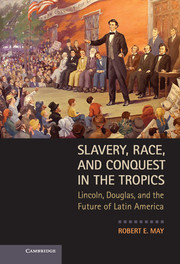Book contents
4 - Caribbeanizing the House Divided
Published online by Cambridge University Press: 05 June 2014
Summary
In the early fall of 1859, about a half-year before the Democratic Party was scheduled to hold its national nominating convention in Charleston, South Carolina, three schooners sat at anchor in Cleveland harbor, each one with a flag on its mast bearing the words: “Douglas and Cuba, 1860!” The flags reflected a hope that Stephen Douglas might harness his identification with Manifest Destiny in yet another bid for the American presidency, and they challenge the traditional narrative about the coming of the American Civil War.
According to most accounts, America’s final showdown over slavery’s expansion occurred in the two years after Douglas helped prevent Kansas statehood under the proslavery Lecompton Constitution. Feeling betrayed by the Little Giant, southern Democrats demanded insurance against Douglas’s Freeport Doctrine in the form of a federal “slave code” for the territories, by which Congress would guarantee slave property within a territory should its legislature prove unwilling or unable to do so. Meanwhile, Lincoln and the Republicans made political hay in the North by claiming that Dred Scott and Lecompton demonstrated that a Slave Power plot was afoot to foist slavery on all the western territories. The next step, they predicted, would be to impose slavery on the North itself. In 1860, the Democratic Party fractured from an inability to resolve the territorial dispute. Northern Democrats (or the “National Democrats” as they dubbed themselves) chose Douglas as their presidential candidate; southern Democrats selected Vice President John Breckinridge of Kentucky. The Democrats’ bitter division helped Lincoln get elected president on a Republican platform denouncing popular sovereignty as fraudulent and denying the authority of either territorial legislatures or Congress to legalize slavery in a territory. Reacting angrily to Lincoln’s victory, seven southern states seceded from the Union over the next three months, setting the stage for the Civil War.
- Type
- Chapter
- Information
- Slavery, Race, and Conquest in the TropicsLincoln, Douglas, and the Future of Latin America, pp. 154 - 204Publisher: Cambridge University PressPrint publication year: 2013



